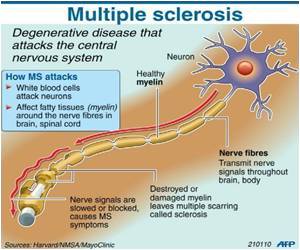The researchers at Washington were successful to identify difference between brains of women and men with multiple sclerosis as to why so many more women than men get the disease.

The findings appear May 8 in The Journal of Clinical Investigation.
Studying mice and people, the researchers found that females susceptible to MS produce higher levels of a blood vessel receptor protein, S1PR2, than males and that the protein is present at even higher levels in the brain areas that MS typically damages.
"It was a Bingo!'' moment - our genetic studies led us right to this receptor," said senior author Robyn Klein, MD, PhD. "When we looked at its function in mice, we found that it can determine whether immune cells cross blood vessels into the brain. These cells cause the inflammation that leads to MS."
An investigational MS drug currently in clinical trials blocks other receptors in the same protein family but does not affect S1PR2. Klein recommended that researchers work to develop a drug that disables S1PR2.
MS is highly unpredictable, flaring and fading at irregular intervals and producing a hodgepodge of symptoms that includes problems with mobility, vision, strength and balance. More than 2 million people worldwide have the condition.
Advertisement
For the new research, Klein studied a mouse model of MS in which the females get the disease more often than the males. The scientists compared levels of gene activity in male and female brains. They also looked at gene activity in the regions of the female brain that MS damages and in other regions the disorder typically does not harm.
Advertisement
Additional experiments showed that S1PR2 opens up the blood-brain barrier, a structure in the brain's blood vessels that tightly regulates the materials that cross into the brain and spinal fluid. This barrier normally blocks potentially harmful substances from entering the brain. Opening it up likely allows the inflammatory cells that cause MS to get into the central nervous system.
When the researchers tested brain tissue samples obtained from 20 patients after death, they found more S1PR2 in MS patients' brains than in people without the disorder. Brain tissue from females also had higher levels of S1PR2 than male brain tissue. The highest levels of S1PR2 were found in the brains of two female patients whose symptoms flared and faded irregularly, a pattern scientists call relapsing and remitting MS.
Klein is collaborating with chemists to design a tracer that will allow scientists to monitor S1PR2 levels in the brains of people while they are living. She hopes this will lead to a fuller understanding of how S1PR2 contributes to MS.
"This is an exciting first step in resolving the mystery of why MS rates are dramatically higher in women and in finding better ways to reduce the incidence of this disorder and control symptoms," said Klein, associate professor of medicine. Klein also is an associate professor of pathology and immunology and of neurobiology and anatomy.
This work was supported by NIH/NINDS grants R01 NS052632 (to RSK), P01 NS059560 (to AHC and RSK) and grants from the Multiple Sclerosis Society (to RSK). BPD is supported by a National Science Foundation Graduate Research Fellowship (DGE-1143954), LCO is supported by Ruth L. Kirschstein Postdoctoral NRSA award (1F32NS0748424-01), LP is a Harry Weaver Neuroscience Scholar of the National MS Society, USA.
Cruz-Orengo L, Daniels BP, Dorsey D, Basak SA, Grajales-Reyes JG, McCandless EE, Piccio L, Schmidt RE, Cross AH, Crosby SD, Klein RS. Sexually S1PR2 expression enhances susceptibility to CNS autoimmunity. The Journal of Clinical Investigation, online May 8, 2014.
Washington University School of Medicine's 2,100 employed and volunteer faculty physicians also are the medical staff of Barnes-Jewish and St. Louis Children's hospitals. The School of Medicine is one of the leading medical research, teaching and patient-care institutions in the nation, currently ranked sixth in the nation by U.S. News & World Report. Through its affiliations with Barnes-Jewish and St. Louis Children's hospitals, the School of Medicine is linked to BJC HealthCare.
Source-Newswise








